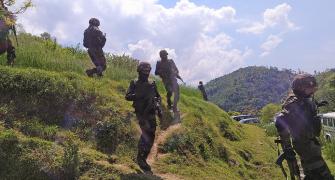On a cold night nearly two years ago, Christina McCoy began to cry. She was watching a segment on ABC's Primetime that followed Britain's Prince Harry as he visited with orphans and AIDS victims in Africa. "My boyfriend looked at me and said, `You want to go there, don't you?'" says McCoy, 33.
She did. McCoy, who had never before traveled internationally, began researching ways to help children in Africa affected by HIV/AIDS. After discovering the costs would be high, she put her plans on hold.
But the hiatus was brief for McCoy, who handles graphics work as a production artist at McClain Finlon Advertising, a 200-person Denver agency. At a staff meeting two months later, managers introduced a new element of the agency's charitable portfolio: the annual Global Do-Good Grant.
- Slideshow: Most Generous Corporate Foundations
- Slideshow: The World's Most Competitive Countries
- Slideshow: The World's Least Competitive Countries
The company would pay all the expenses, and give away a two-week paid sabbatical, to enable a staffer to do something to improve the world.
About 13% of companies offer paid time off for employees to volunteer, according to the Society for Human Resource Management's 2005 Benefits Survey Report. Although a handful of large companies like Citizens Financial Group, Timberland, Xerox and Wells Fargo award some workers with paid leave for extended community service work, similar opportunities from smaller businesses are less common.
Limited resources are often barriers, but McClain Finlon's CEO Cathey M. Finlon says companies of all sizes with a commitment from the top can offer their own versions of her company's Global Do-Good Grant.
The company's grant was just what McCoy needed. She submitted a proposal explaining her desire to work with children in Africa through a program organized by the nonprofit Cross-Cultural Solutions (CCS).
- Slideshow: Index Highlights of The World's Most Competitive Countries
- Slideshow: World's Most Corrupt Countries
Her proposal was chosen from the eight applications submitted, judged on criteria like the originality of the mission, the benefit to humanity and one's passion for the cause. "The idea of orphanage work was foremost in my mind, but I was open to any opportunity," she says.
That's the kind of sentiment CEO Cathey M. Finlon and her management team were hoping to generate when they hatched the idea. "We have stated values, like passion, innovation and creativity, and we're working to have them more imbued in the organization. [The grant] is one of the beginnings of how you do that. It came from a desire to really engage our people and have them realize their full potential," she says.
But Finlon also hopes the grants benefit the business by serving as a motivational tool in an industry known for burn-out, 60-hour workweeks and annual turnover rates of about 25%.
"It's so incredibly important for people today to feel part of something larger than themselves," she says. "It accentuates the purpose of what we do every day, and out of that comes loyalty and commitment. It has a way of bringing together people who need to understand each other and collaborate in big ways."
CCS ultimately placed McCoy, who has a bachelor of fine arts degree, in an art teacher position at a school in a poor Tanzanian farming village. Armed with rudimentary knowledge of Swahili, anti-malaria pills and a batch of inoculations against hepatitis A and B, meningitis and other diseases, she arrived at the CCS-run dormitory in Patandi, Tanzania.
It would be her home for the next three weeks. (She tacked on an earned week of vacation.)
Each day McCoy taught drawing lessons at the school to 30 students from ages 13 to 25. "I often wondered how many were orphans who had lost their parents to AIDS," she says, "but I would never really know." Discussing AIDS-related deaths was taboo, and she was unable to tell who was being raised by other family members after the death of both parents.
As for her impact: "I would love to say I changed lives in the time I spent there, but really, the changes were more along the line of `opening eyes,'" McCoy says. "The benefits we received were increased understanding of each other's lives and cultures."
One student in particular remains fixed in her mind: a young man in his late teens named Pendael who was "so unbelievably talented." On her last day at the school he gave her a homemade papier-mâché piece.
"I will forever think about him," McCoy says, "and wonder if, in his land of limited opportunity, he is accomplishing all the success he truly deserves."
The experience changed the way she thinks. She says of her first morning back in Denver, "I looked at how many products, lotions and sprays [I have] and thought, `Is this really necessary?'" Not surprisingly, she is grateful for her volunteer opportunity. "I really ended up doing what I was hoping to do from the get-go," says McCoy, a native of Fort Calhoun, Neb. "I have always been really happy with this agency, and just knowing where its priorities are makes a big difference."
Grant recipients are required to give a company-wide presentation about their trips when they return, and McCoy's was well-received. "You could hear a pin drop," Finlon says.
"She put together this imaginative presentation with videos and photos and diaries she kept. For all of us it was an inspiration."
A version of this story originally appeared in Pink Magazine.







